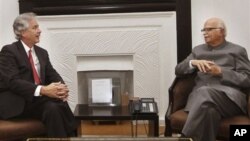“Our strategic partnership with India is of abiding importance to the United States and one in which both our governments continue to make broad and enduring investments,” U.S. Deputy Secretary of State William Burns said in a recent press interview in New Delhi, India.
“Strong support across the political spectrum in the United States, as well as in India, gives us reason for continued optimism about the bilateral relationship in the years ahead.”
Bilateral trade between India and the United States is flourishing and, despite the economic headwinds in both countries, reached nearly $90 billion last year
“We have done a considerable amount to remove impediments to further expansion of our trade relationship, including in high technology and defense trade, but there is more that we can do,” Deputy Secretary Burns said.
“Concluding a Bilateral Investment Treaty should be a top priority for both our countries, and would send a positive signal to our business communities.
“We are encouraged by the Indian government’s recent bold steps toward economic reforms,” Deputy Secretary Burns said. “These reforms will foster economic growth, with increased investment, and greater prosperity. Once implemented, we are confident that U.S. investors will respond positively to these measures with concrete, job-creating projects and proposals.
“I also look forward to exchanging views . . . . on regional economic cooperation, including with Afghanistan and Pakistan,” Deputy Secretary Burns said. “We welcome the progress the Indian government has made with Pakistan on building trade and investment ties and appreciate the leading role India has played in spurring private sector investment in Afghanistan.
“India has an important voice in the Asia-Pacific region,” Deputy Secretary Burns continued. “I look forward to discussing our mutual goals for the East Asia Summit and the Association of South East Asian Nations Summit, along with our shared interests in promoting maritime security in the Indo-Pacific region and greater economic connectivity between India and Southeast Asia.
“India is a model of democratic governance, tolerance and rule of law, and can play a critical role throughout the Middle East and North Africa, as well as East Asia, to support the strengthening of democratic institutions, civil society, education, and many other fields,” Deputy Secretary Burns said in conclusion. “We look forward to partnering with India on these important challenges in the months and years to come.”
“Strong support across the political spectrum in the United States, as well as in India, gives us reason for continued optimism about the bilateral relationship in the years ahead.”
Bilateral trade between India and the United States is flourishing and, despite the economic headwinds in both countries, reached nearly $90 billion last year
“We have done a considerable amount to remove impediments to further expansion of our trade relationship, including in high technology and defense trade, but there is more that we can do,” Deputy Secretary Burns said.
“Concluding a Bilateral Investment Treaty should be a top priority for both our countries, and would send a positive signal to our business communities.
“We are encouraged by the Indian government’s recent bold steps toward economic reforms,” Deputy Secretary Burns said. “These reforms will foster economic growth, with increased investment, and greater prosperity. Once implemented, we are confident that U.S. investors will respond positively to these measures with concrete, job-creating projects and proposals.
“I also look forward to exchanging views . . . . on regional economic cooperation, including with Afghanistan and Pakistan,” Deputy Secretary Burns said. “We welcome the progress the Indian government has made with Pakistan on building trade and investment ties and appreciate the leading role India has played in spurring private sector investment in Afghanistan.
“India has an important voice in the Asia-Pacific region,” Deputy Secretary Burns continued. “I look forward to discussing our mutual goals for the East Asia Summit and the Association of South East Asian Nations Summit, along with our shared interests in promoting maritime security in the Indo-Pacific region and greater economic connectivity between India and Southeast Asia.
“India is a model of democratic governance, tolerance and rule of law, and can play a critical role throughout the Middle East and North Africa, as well as East Asia, to support the strengthening of democratic institutions, civil society, education, and many other fields,” Deputy Secretary Burns said in conclusion. “We look forward to partnering with India on these important challenges in the months and years to come.”




